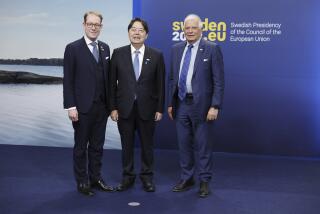Japan May Go Its Own Way on Economic Aid to China : Sanctions: Tokyo argues that Beijing should not be isolated from the world community. Kaifu will see Bush on Saturday.
- Share via
TOKYO — Prime Minister Toshiki Kaifu was reported Thursday to have told leaders of his ruling party that Japan may make its “own independent judgment” on removing a freeze on its economic aid to China after next week’s Houston economic summit.
In a dinner meeting before Kaifu leaves today to meet President Bush on Saturday, four executives of the ruling Liberal Democratic Party urged Kaifu to explain to leaders of the United States and the five other advanced industrialized democracies who will meet Monday through Wednesday in Houston that “Japan and China have a special relationship.”
“I intend to do that,” Kaifu was reported as replying. “I also intend to seek the understanding of the United States about China and inform President Bush that Japan may make its own decision” on resuming economic aid.
Both the Nihon Keizai and the Yomiuri newspapers carried the report of Kaifu’s comments in their morning editions today.
Japan and the World Bank are China’s two main sources of economic aid. Japan is also a major source of private commercial loans to China. Those loans also were suspended after the seven nations agreed to impose economic sanctions at last year’s economic summit in reaction to China’s violent suppression of pro-democracy demonstrations in June last year.
The “special relationship” that the ruling party leaders cited was a reference to Japan’s past aggression against China and the important role that Japanese aid plays in underwriting improvements in China’s infrastructure, such as railways, dams, ports, and natural resource development.
On Thursday, three former prime ministers--Zenko Suzuki, Yasuhiro Nakasone and Noboru Takeshita--also urged Kaifu to press the other six leaders at the Houston summit to resume economic aid to China.
A Foreign Ministry official, who met foreign correspondents on the condition that he not be named, said Japan has consistently argued that China must not be isolated from the international community.
The diplomat cited China’s release of more than 500 political prisoners, the lifting of martial law in both Beijing and Lhasa, Tibet, China’s resumption of the Fulbright exchange of scholars with the United States, its release of dissident Fang Lizhi and his wife, Li Shuxian, and, “most important, the firm commitment of the Chinese leadership to . . . policies of reform and openness.”
“The thing we have to do now is respond in kind to these positive signs emanating from China,” he said. “The best way to promote democracy in China is to shore up the living standard of the people.”
Apart from whatever action Japan itself may take, the diplomat said, Kaifu will oppose any economic summit declaration that reiterates last year’s “censure” of China for the June 3-4, 1989, crackdown around central Beijing’s Tian An Men Square, “let alone imposing additional sanctions.”
During a trip to China in August, 1988, Takeshita promised that Japan would extend a five-year package of 810 billion yen ($5.4 billion) in loans to China between 1990 and 1994. Negotiations to select projects for the loans, however, have been frozen since Japan joined the other six nations in approving sanctions against China.
In 1989, Japan provided China with $747.5 million in loans for infrastructure projects.
More to Read
Sign up for Essential California
The most important California stories and recommendations in your inbox every morning.
You may occasionally receive promotional content from the Los Angeles Times.










